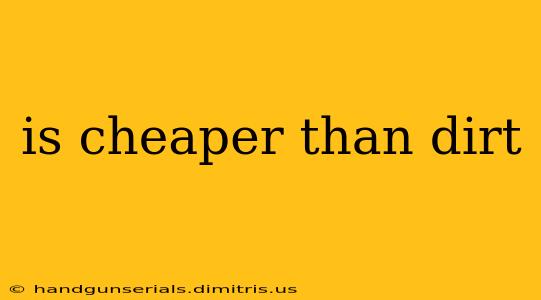The phrase "cheaper than dirt" is a common idiom used to describe something incredibly inexpensive. But where did this expression originate, and what does it really mean in today's context? Let's delve into the history and modern implications of this popular saying.
The Origins of "Cheaper Than Dirt"
While pinpointing the exact origin is difficult, the phrase's effectiveness stems from the readily understood comparison. Dirt, readily available and seemingly without cost, provides a powerful benchmark for extreme affordability. The image conjured is one of overwhelming abundance and minimal price. The phrase likely emerged organically in everyday speech, its popularity solidifying over time through repeated use. Its enduring appeal lies in its simplicity and effectiveness in conveying a message of exceptional value.
Modern Interpretations and Context
Today, "cheaper than dirt" is used in various contexts, often with a degree of hyperbole. While it doesn't literally mean something is free, it emphasizes the remarkably low cost. This idiom is often employed in:
-
Advertising: Businesses may use this phrase to highlight the affordability of their products or services, attracting budget-conscious consumers. However, it’s crucial for consumers to remain critical and examine the overall value proposition beyond the advertised price.
-
Everyday Conversation: Individuals might use this phrase casually to describe a great bargain, a surprisingly inexpensive item, or a service obtained at a significantly discounted rate. The context usually clarifies the speaker's intended meaning.
-
Comparisons: The phrase is used to highlight the price advantage of one product or service over another. For example, "This software is cheaper than dirt compared to its competitors."
Beyond the Price Tag: Considering Value
While the low price is a significant draw, it's vital to remember that "cheaper than dirt" doesn't automatically imply high quality. Sometimes, extremely low prices might reflect compromises in quality, durability, or customer service. Therefore, a wise consumer should consider the overall value proposition before making a purchase solely based on the price.
Factors to consider when encountering "cheaper than dirt" claims:
- Quality: Is the product or service durable and reliable?
- Customer Service: What level of support is offered?
- Hidden Costs: Are there any unexpected fees or charges?
- Reputation: Does the seller or company have a good track record?
Conclusion: A Powerful Idiom, A Cautious Approach
"Cheaper than dirt" remains a powerful and widely understood idiom signifying exceptional affordability. However, it’s crucial for consumers to approach such claims with a critical and discerning eye, assessing the overall value and not solely focusing on the price. Ultimately, the true value of a product or service often lies beyond the price tag.

